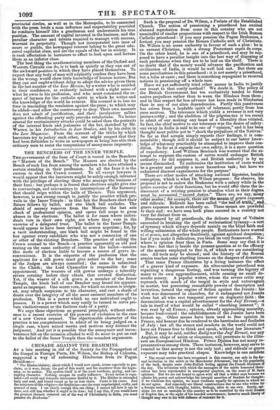THE BENCHERS OF THE INNER TEMPLE.
THE government of the Inns of Court is vested in the Benchers or " Masters of the Bench." The Masters are elected by the Bench of each Inn from among the members who have attained a certain standing in their profession. In all the Inns it is the custom to elect the Crown counsel. To all except lawyers it woubl appear that the barristers might be safely enough intrusted with the privilege of electing those who manage the business of their Inns : but perhaps it is feared that elections might give rise to canvassings, canvassings canvassins to interruptions of the harmony that should reign within the halls of Themis. This argument, however, is not strong enough to justify the practice which veils in the Inner Temple : in that Inn the Benchers elect t eir future fellows by ballot, and one black ball excludes. The shield of secrecy removes from the Masters the last sole check of professional opinion, and opens full scope to gross abuses in the elections. The ballot is for cases where indivi- duals vote in their own right, not where they vote in the exercise of a delegated trust. The ballot in the Inner Temple would appear to have been devised to screen nepotism ; for, by a tacit understanding, one black ball might be found in the box against every candidate who was not a connexion of one or other of the existing Benchers. The practice of calling the Crown counsel to the Bench—a practice apparently as old and resting on the same authority of custom as the ballot—renders this mode of election liable to become a source of grave in- convenience. It is the etiquette of the profession that the applicant for a silk gown must give notice to the bar ; some of the Judges are always consulted ; the name is submitted to the Chiefs; the Lord Chancellor is responsible for the appointment. The wearers of silk gowns undergo a tolerably severe scrutiny before they obtain that coveted distinction. Yet, if the wearer of a silk gown is a member of the Inner Temple, the black ball of one Bencher may brand his appoint- ment as improper. One secret vote, for which no reason is assign- ed, may attach suspicion to his character, and cast a shade of doubt over the integrity of all the most eminent members of the profession. This is a power which no one individual ought to possess. It is a power which may easily be turned to serve pri- vate vindictiveness or the factious ends of a party. We urge these objections on general principles, without refer- ence to a recent exercise of the powers of exclusion in the case of a new Crown counsel. The objectionable character of the practice is too comprehensive to admit of its being judged on a single case, where mixed merits and motives may distract the judgment. And yet it is possible that the annoyance and incon- venience felt on the occasion alluded to will do more to put an end to the ballot of the Inner Temple than the soundest arguments.


























 Previous page
Previous page